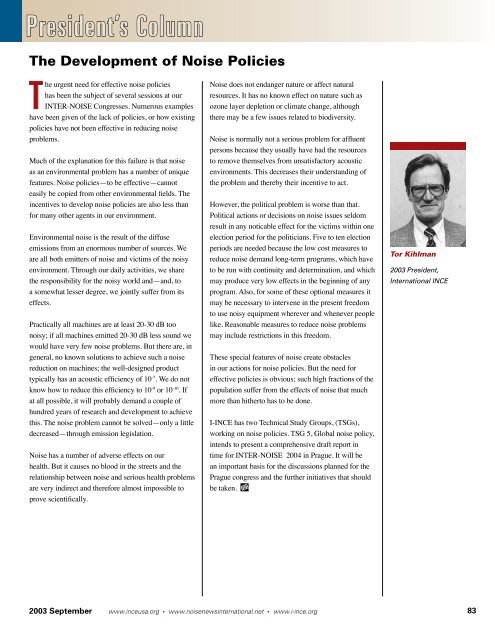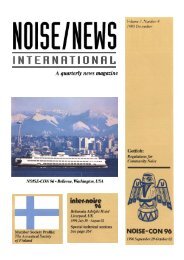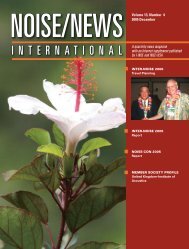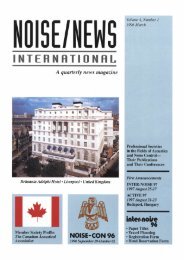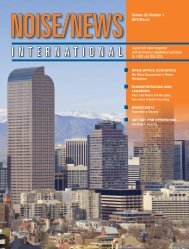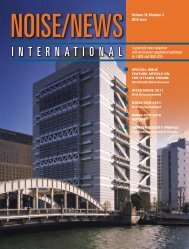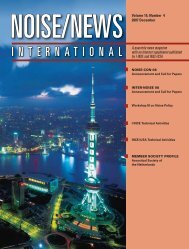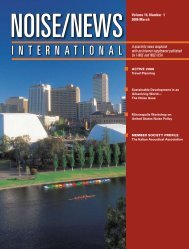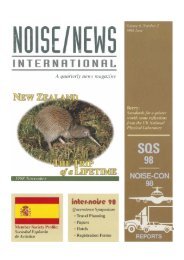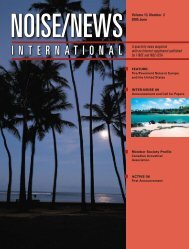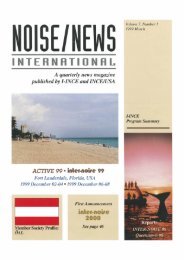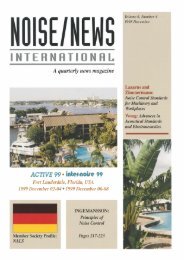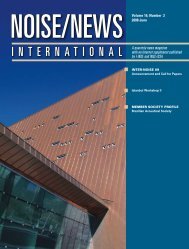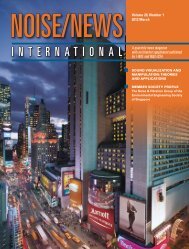Volume 11, Number 3, September, 2003 - Noise News International
Volume 11, Number 3, September, 2003 - Noise News International
Volume 11, Number 3, September, 2003 - Noise News International
Create successful ePaper yourself
Turn your PDF publications into a flip-book with our unique Google optimized e-Paper software.
President’s Column<br />
The Development of <strong>Noise</strong> Policies<br />
The urgent need for effective noise policies<br />
has been the subject of several sessions at our<br />
INTER-NOISE Congresses. Numerous examples<br />
have been given of the lack of policies, or how existing<br />
policies have not been effective in reducing noise<br />
problems.<br />
Much of the explanation for this failure is that noise<br />
as an environmental problem has a number of unique<br />
features. <strong>Noise</strong> policies—to be effective—cannot<br />
easily be copied from other environmental fields. The<br />
incentives to develop noise policies are also less than<br />
for many other agents in our environment.<br />
Environmental noise is the result of the diffuse<br />
emissions from an enormous number of sources. We<br />
are all both emitters of noise and victims of the noisy<br />
environment. Through our daily activities, we share<br />
the responsibility for the noisy world and—and, to<br />
a somewhat lesser degree, we jointly suffer from its<br />
effects.<br />
Practically all machines are at least 20-30 dB too<br />
noisy; if all machines emitted 20-30 dB less sound we<br />
would have very few noise problems. But there are, in<br />
general, no known solutions to achieve such a noise<br />
reduction on machines; the well-designed product<br />
typically has an acoustic efficiency of 10 -7 . We do not<br />
know how to reduce this efficiency to 10 -9 or 10 -10 . If<br />
at all possible, it will probably demand a couple of<br />
hundred years of research and development to achieve<br />
this. The noise problem cannot be solved—only a little<br />
decreased—through emission legislation.<br />
<strong>Noise</strong> has a number of adverse effects on our<br />
health. But it causes no blood in the streets and the<br />
relationship between noise and serious health problems<br />
are very indirect and therefore almost impossible to<br />
prove scientifically.<br />
<strong>Noise</strong> does not endanger nature or affect natural<br />
resources. It has no known effect on nature such as<br />
ozone layer depletion or climate change, although<br />
there may be a few issues related to biodiversity.<br />
<strong>Noise</strong> is normally not a serious problem for affluent<br />
persons because they usually have had the resources<br />
to remove themselves from unsatisfactory acoustic<br />
environments. This decreases their understanding of<br />
the problem and thereby their incentive to act.<br />
However, the political problem is worse than that.<br />
Political actions or decisions on noise issues seldom<br />
result in any noticable effect for the victims within one<br />
election period for the politicians. Five to ten election<br />
periods are needed because the low cost measures to<br />
reduce noise demand long-term programs, which have<br />
to be run with continuity and determination, and which<br />
may produce very low effects in the beginning of any<br />
program. Also, for some of these optional measures it<br />
may be necessary to intervene in the present freedom<br />
to use noisy equipment wherever and whenever people<br />
like. Reasonable measures to reduce noise problems<br />
may include restrictions in this freedom.<br />
These special features of noise create obstacles<br />
in our actions for noise policies. But the need for<br />
effective policies is obvious; such high fractions of the<br />
population suffer from the effects of noise that much<br />
more than hitherto has to be done.<br />
I-INCE has two Technical Study Groups, (TSGs),<br />
working on noise policies. TSG 5, Global noise policy,<br />
intends to present a comprehensive draft report in<br />
time for INTER-NOISE 2004 in Prague. It will be<br />
an important basis for the discussions planned for the<br />
Prague congress and the further initiatives that should<br />
be taken.<br />
NNI<br />
Tor Kihlman<br />
<strong>2003</strong> President,<br />
<strong>International</strong> INCE<br />
<strong>2003</strong> <strong>September</strong> www.inceusa.org • www.noisenewsinternational.net • www.i-ince.org<br />
83


